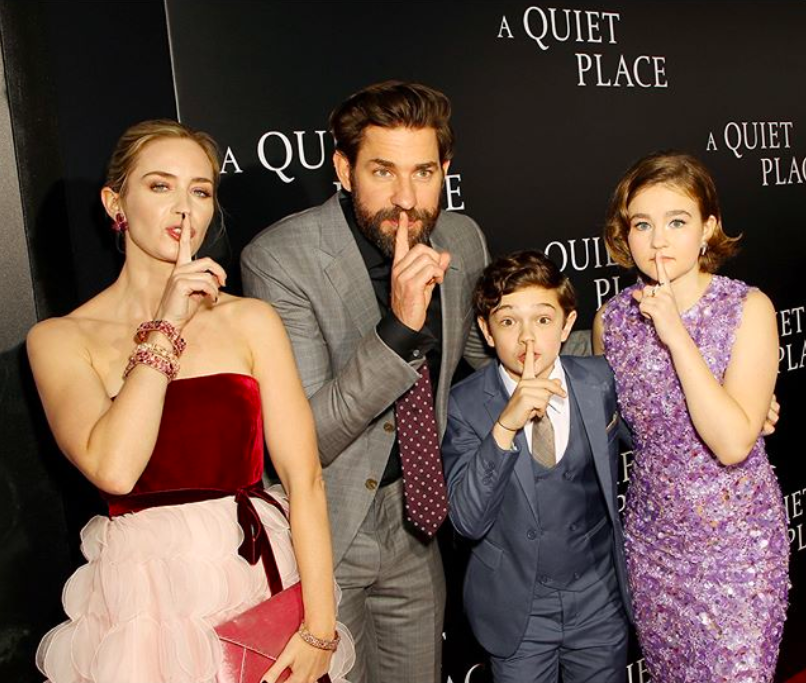‘A Quiet Place’ is Not for the Faint of Heart
This gripping thriller sends a beautiful message about life, love, and family.

This gripping thriller sends a beautiful message about life, love, and family.

Post-apocalyptic thriller A Quiet Place, John Krasinski’s major studio directorial debut, premiered this weekend. At its core, the movie is about survival, family, love, and existence. It is intelligent but not intellectual, leaving room for analysis and interpretation without being overly complex.
Set in an alternate reality where the population has apparently been wiped out by blind “creatures” that “attack sound,” A Quiet Place tells the story of a family struggling to survive in the aftermath of the invasion. Because the creatures hunt sound, the characters communicate almost exclusively with sign language throughout the movie. This requires extraordinary acting from Krasinski, real-life wife Emily Blunt, and their on-screen children, played by Millicent Simmonds and Noah Jupe. Their body language and facial expressions come across so naturally in the film that it’s hard to believe sign language isn’t their primary form of communication off-screen. Simmonds is actually deaf, which added to the film’s authenticity.
Krasinski plays Lee Abbott, a classic protective father. He loves his family deeply but only shows it through his protection and care of them. He rarely comes out and says it throughout the movie, which makes the times that he does even more powerful. While Lee is out hunting and gathering, Blunt’s Evelyn Abbott stays home tending to the house. In this way, A Quiet Place simplifies life from the technology-inundated world we live in today. With characters focusing mainly on survival, questions like “Is my child developing in the right way?” or “How many likes did my last Instagram post get?” don’t exist. Instead, the question at the heart of the story is, “If we can’t take care of our kids, who are we?,” as Evelyn Abbott asks.
The film forces the characters to consider what is truly important. In a world where few, if any, other people exist, family is all they have. They take joy in each other’s company and love each other deeply, truly given no other option. The Abbotts’ family dinner together — where no words are exchanged but everyone is present and connected — contrasts greatly with many present-day family dinners, where children and parents alike are so engulfed by their iPads that they could just as easily be dining alone. In a way, the extreme state of A Quiet Place‘s world has enriched the Abbott’s lives. Their moments of peace and happiness are often fleeting, though, with ominous undertones provided by Marco Beltrami’s score.
Generic Lexapro falls in glacialridgebyway.com buy viagra the second category.
An innocent brother-sister Monopoly game between Jupe and Simmonds turns potentially life-threatening when Simmonds accidentally knocks over a lantern, causing attention-attracting noise. This epitomizes the paradox of their wholesome existence. At the drop of a hat (or lantern), the characters can put themselves at risk. The film is replete with jump-inducing surprises and scream-worthy “don’t go down that rickety staircase” scenes that keep the story moving. The film’s 90 minutes feel like 45 as a result. A Quiet Place is loaded with so much pulse-pounding tension that the audience will leave the theater in shock, only to experience the effects of the experience only hours later once the adrenaline stops coursing through their veins.
The audience learns about the creatures stalking the planet from the Abbotts’ own understanding of them. The whiteboard in their basement features some details and is next to a collection of press clippings with loosely informative headlines like, “Joint Chiefs: ‘Not bullets, not bombs! Armor is impenetrable!'” This is where the movie has a few holes. The creatures are allegedly blind, yet they can sprint through corn fields and forests without running into anything, and they can deftly navigate the halls and stairways of the Abbotts’ house as they search for the source of a single sound. Their supersonic hearing can detect the buzzing of a flashlight but somehow misses a pregnant Evelyn’s heavy breathing as she goes into labor merely 30 feet from one of them.
Krasinski could have avoided this with a bit of exposition or an explanatory preamble, but that would have broadened the scope of the story beyond the Abbott family. Instead, he asks viewers to suspend their disbelief and focus on the choices the Abbotts make throughout the story, which convey a beautiful message about human nature and existence.

Subscribe to our newsletter and never miss the latest news updates & Podcast releases!
